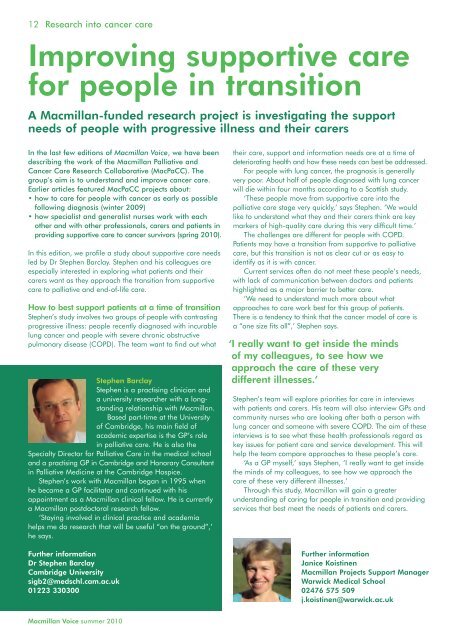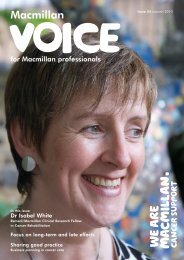12Research into cancer careImproving supportive carefor people in transitionA <strong>Macmillan</strong>-funded research project is investigating the supportneeds of people with progressive illness and their carersIn the last few editions of <strong>Macmillan</strong> Voice, we have beendescribing the work of the <strong>Macmillan</strong> Palliative and<strong>Cancer</strong> Care Research Collaborative (MacPaCC). Thegroup’s aim is to understand and improve cancer care.Earlier articles featured MacPaCC projects about:• how to care for people with cancer as early as possiblefollowing diagnosis (winter 2009)• how specialist and generalist nurses work with eachother and with other professionals, carers and patients inproviding supportive care to cancer survivors (spring 2010).In this edition, we profile a study about supportive care needsled by Dr Stephen Barclay. Stephen and his colleagues areespecially interested in exploring what patients and theircarers want as they approach the transition from supportivecare to palliative and end-of-life care.How to best support patients at a time of transitionStephen’s study involves two groups of people with contrastingprogressive illness: people recently diagnosed with incurablelung cancer and people with severe chronic obstructivepulmonary disease (COPD). The team want to find out whatStephen BarclayStephen is a practising clinician anda university researcher with a longstandingrelationship with <strong>Macmillan</strong>.Based part-time at the Universityof Cambridge, his main field ofacademic expertise is the GP’s rolein palliative care. He is also theSpecialty Director for Palliative Care in the medical schooland a practising GP in Cambridge and Honorary Consultantin Palliative Medicine at the Cambridge Hospice.Stephen’s work with <strong>Macmillan</strong> began in 1995 whenhe became a GP facilitator and continued with hisappointment as a <strong>Macmillan</strong> clinical fellow. He is currentlya <strong>Macmillan</strong> postdoctoral research fellow.‘Staying involved in clinical practice and academiahelps me do research that will be useful “on the ground”,’he says.Further informationDr Stephen BarclayCambridge Universitysigb2@medschl.cam.ac.uk01223 330300their care, support and information needs are at a time ofdeteriorating health and how these needs can best be addressed.For people with lung cancer, the prognosis is generallyvery poor. About half of people diagnosed with lung cancerwill die within four months according to a Scottish study.‘These people move from supportive care into thepalliative care stage very quickly,’ says Stephen. ‘We wouldlike to understand what they and their carers think are keymarkers of high-quality care during this very difficult time.’The challenges are different for people with COPD.Patients may have a transition from supportive to palliativecare, but this transition is not as clear cut or as easy toidentify as it is with cancer.Current services often do not meet these people’s needs,with lack of communication between doctors and patientshighlighted as a major barrier to better care.‘We need to understand much more about whatapproaches to care work best for this group of patients.There is a tendency to think that the cancer model of care isa “one size fits all”,’ Stephen says.‘I really want to get inside the mindsof my colleagues, to see how weapproach the care of these verydifferent illnesses.’Stephen’s team will explore priorities for care in interviewswith patients and carers. His team will also interview GPs andcommunity nurses who are looking after both a person withlung cancer and someone with severe COPD. The aim of theseinterviews is to see what these health professionals regard askey issues for patient care and service development. This willhelp the team compare approaches to these people’s care.‘As a GP myself,’ says Stephen, ‘I really want to get insidethe minds of my colleagues, to see how we approach thecare of these very different illnesses.’Through this study, <strong>Macmillan</strong> will gain a greaterunderstanding of caring for people in transition and providingservices that best meet the needs of patients and carers.Further informationJanice Koistinen<strong>Macmillan</strong> Projects <strong>Support</strong> ManagerWarwick Medical School02476 575 509j.koistinen@warwick.ac.uk<strong>Macmillan</strong> Voice summer 2010
Rehabilitation13CARE – a uniquerehabilitation serviceWho are we?The <strong>Macmillan</strong> Lung <strong>Cancer</strong> CAREService is a proactive rehabilitationservice for people with lung cancer andmesothelioma. Based at NottinghamUniversity Hospitals NHS Trust, theCARE service (cachexia, anorexia andrelated experiences), works closely withexisting cancer and specialist palliativecare services to provide holistic support.The multidisciplinary teamincludes Cheryl Percival, a dietitian;Rachel Hill, an occupational therapist;Helena Alvey, a physiotherapist; andVal Godfrey, a data manager.There is a particular focus on theeffects of the cachexia-anorexiasyndrome, where improvements aredesperately required. This syndromecauses a progressive wasting of skeletalmuscle which, together with symptomssuch as fatigue, impairs functionalability. Lung cancer has one of thehighest incidences of cachexia, withabout one-third of people alreadymalnourished at the time of diagnosis.What do we do?All people recently diagnosed with athoracic cancer are invited to completethe Sheffield Profile for Assessment andReferral to Care (SPARC) questionnaireto identify their supportive and palliativecare needs. This covers seven areas ofpotential need:• physical symptoms• psychological issues• personal issues• treatment issues• family and social issues• religious and spiritual issues• communication and information issues• independence and activity.The results are discussed at amultidisciplinary meeting, which includesthe lung cancer nurse specialists and aconsultant in palliative medicine. Basedon the needs uncovered, the appropriateteam members undertake a moredetailed assessment and provide therapy.All patients are assessed by the dietitian.The emphasis on rehabilitationhelps improve function, promoteindependence and helps people toadapt to their situation. This involvesproviding a routine nutritional assessmentand intervention, and for many, adviceon managing symptoms such as fatigueand breathlessness, the provision ofequipment and referral to other services.This proactive identification of needs, thetimely provision of appropriate supportand the continuity of care all contributeto a ‘crisis-prevention’ approach.Lynn Payne, one person to benefitfrom the service after having a lungremoved, said, ‘The new lung cancerteam has been brilliant, visiting me athome and providing the emotionalsupport I needed. I know they’re alwaysat the end of the phone if I need them.’What have we alreadyachieved?The team has already:• seen about 90 new patients andprovided 560 face-to-face episodesof care and 620 telephone reviews;about 60% of new and 30% of followupassessments take place in thepatient’s home• developed service documentationand some information leaflets to fillexisting gaps, for example, difficultysleeping at night• piloted the SPARC questionnaire in100 patients and found it to be wellreceived(this has also been acceptedfor publication and poster presentationat European Association for PalliativeCare Research Congress 2010)• summarised the supportive andpalliative care needs of 200 peoplewith thoracic cancer (accepted forposter presentation at EuropeanAssociation for Palliative CareResearch Congress 2010)• made links with national initiatives,such as the National <strong>Cancer</strong> TeamHolistic Needs Assessment and<strong>Cancer</strong> and Palliative CareRehabilitation Workforce projects• begun to evaluate the specificcontributions of the individualmembers of the team• made a successful bid to <strong>Macmillan</strong> fora therapy assistant to support the team• submitted a bid for a ‘Research forPatient Benefit’ grant for anindependent evaluation of the service.Dr Andrew Wilcock, <strong>Macmillan</strong>Reader/Honorary Consultant inPalliative Medicine and clinical lead forthe project says, ‘About 65,000 peoplein the UK are living with a diagnosisof thoracic cancer at any one time.Greater understanding of their needsand the provision of better support fromthe time of diagnosis has the potentialto optimise their independence andquality of life, and to help them toremain in their preferred place of care.This <strong>Macmillan</strong>-funded project will notonly influence local service provision,but will also feed into national palliativecare and rehabilitation initiatives. It willalso provide a model of care whichcould be rolled out to people with othercancers or conditions.’Related information<strong>Macmillan</strong> has a tool kit forprofessionals called the <strong>Macmillan</strong>Durham Cachexia Pack. It helps toguide professionals in the assessmentand management of common problemsseen in people with anorexia-cachexiasyndrome. It can be downloadedfrom the ‘health and social careprofessionals’ section of the Learn Zone.Go to macmillan.org.uk/learnzoneFurther informationDr Andrew Wilcock DM FRCP<strong>Macmillan</strong> Reader in PalliativeMedicine and Medical OncologyUniversity of NottinghamHayward House <strong>Macmillan</strong>Specialist Palliative Care <strong>Cancer</strong> UnitNottingham University HospitalsNHS Trust, Nottingham NG5 1PB0115 9627 7780115 9627 779andrew.wilcock@nottingham.ac.uk<strong>Macmillan</strong> Voice summer 2010
















